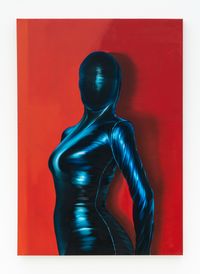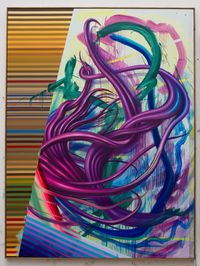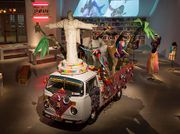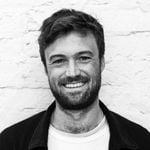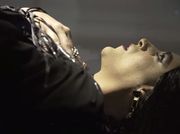Rodolpho Parigi is part of a new generation of Brazilian artists who emerged in the early 2000s. The artist's work lies in a liminal space between abstraction and figuration, entwining a series of references that range from the tradition of Art History, with particular emphasis on Rubens' baroque corporeality, to graphic design, advertising, scientific illustrations, pop culture, anatomical planes, and music. Together with dance, music is notably responsible for orchestrating the gestural dynamism that characterises Parigi's figures, which emanates from formal and structural vigour, rather than from the nature of the brush stroke on the surface of the canvas.
Read MoreRodolpho Parigi notably summarises his process with the statement, 'there is something alchemical here.' Indeed, the artist operates with singular transfiguration anchored in a sense of excess, whereby he consolidates fragments of extremely diverse images and forms, through the use of saturated and luminous colour palettes that construct a futurist retro. The minutely controlled process of execution and compositional organisation amount to an ornamental strategy that resists traditional plays on perspective and forbids the gaze from resting, leading it to incessantly roam the canvas. In Parigi's paintings, the high tech present on the works' thematic meets oil painting's centenary virtuosity; while the organic merges with the artificial, creating an overall provocative sense of strangeness.
Rodolpho Parigi was born in 1977, in São Paulo, Brazil, where he lives and works. Main solo exhibitions include: Fancy Performance, at Pinacoteca do Estado de São Paulo (2017), in São Paulo, Brazil; Levitação, at Galeria Nara Roesler (2015), in São Paulo, Brazil; a solo presentation at Casa Modernista (2013), in São Paulo, Brazil; and AtraQue, at Galeria Nara Roesler (2011), in São Paulo, Brazil. Group exhibitions include: Da humanidade: 100 artistas do acervo, at Museu de Arte Brasileira da Fundação Armando Álvares Penteado (2020), in São Paulo, Brazil; Da tradição à experimentação, at Fundação Iberê Camargo (FIC) (2019), in Porto Alegre, Brazil; Histórias da sexualidade, at Museu de Arte de São Paulo (MASP) (2017), in São Paulo, Brazil; Unanimous Night, at Contemporary Art Centre (CAC) (2017), in Vilnius, Lithuania; LOL Levels of Life 1-2, at Artspace (2014), in Auckland, New Zealand; Works on Paper, at Rabitthole Space (2011), in New York, USA. His works are part of numerous important institutional collections, such as: Instituto Itaú Cultural, São Paulo, Brazil; Museu de Arte Brasileira da Fundação Armando Alvares Penteado (MAB-FAAP), São Paulo, Brazil; Museu de Arte Moderna da Bahia (MAM-BA), Salvador, Brazil; and Pinacoteca do Estado de São Paulo, São Paulo, Brazil; amongst others.
Text courtesy Galeria Nara Roesler.
